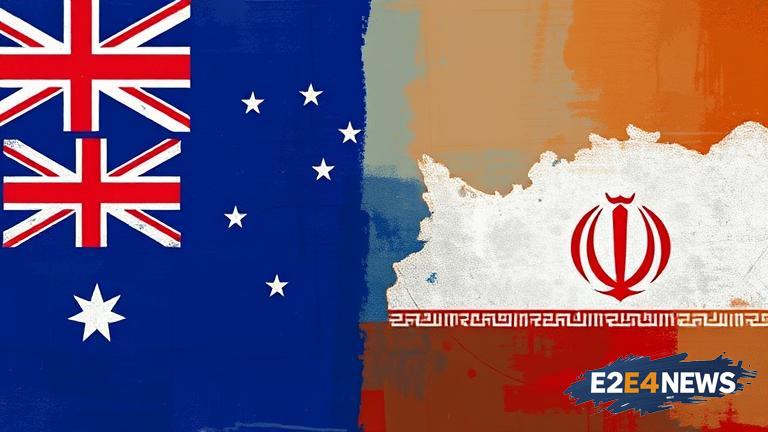Australia’s recent acknowledgment of the Iranian threat is a significant development in the country’s foreign policy. For years, Australia has maintained a relatively neutral stance towards Iran, focusing on diplomatic efforts to resolve regional conflicts. However, the growing threat posed by Iran’s nuclear program, ballistic missile tests, and support for terrorist organizations has forced Australia to reevaluate its position. The Australian government has expressed concerns over Iran’s increasing aggression in the region, including its involvement in the Syrian civil war and its support for militant groups such as Hezbollah. The country’s defense minister has stated that Iran’s actions are a significant threat to regional stability and global security. Australia’s shift in stance is also driven by its close alliance with the United States, which has been a vocal critic of Iran’s nuclear program. The US has imposed severe sanctions on Iran, citing its failure to comply with international nuclear agreements. Australia has also imposed sanctions on Iran, targeting individuals and entities involved in the country’s nuclear program. The Iranian government has responded to Australia’s new stance, accusing the country of bowing to US pressure. Iran’s foreign minister has stated that Australia’s actions are unjustified and will only serve to escalate tensions in the region. Despite the tensions, Australia has emphasized its commitment to finding a diplomatic solution to the conflict. The country’s foreign minister has stated that Australia is willing to work with international partners to find a peaceful resolution to the crisis. However, the minister has also warned that Australia will not hesitate to take action to protect its national interests and regional security. The Australian government has also expressed concerns over Iran’s human rights record, citing the country’s treatment of political prisoners and its suppression of free speech. The country’s parliament has passed a motion condemning Iran’s human rights abuses and calling for the release of political prisoners. The motion has been welcomed by human rights groups, who have long criticized Iran’s poor human rights record. Australia’s new stance on Iran has also been welcomed by its allies in the region, including the United Arab Emirates and Saudi Arabia. The two countries have long been critical of Iran’s actions in the region and have welcomed Australia’s decision to take a stronger stance against the country. However, the move has also been criticized by some, who argue that it will only serve to escalate tensions in the region. Critics argue that Australia’s new stance is driven by its close alliance with the US and that the country should instead focus on finding a diplomatic solution to the conflict. Despite the criticism, the Australian government remains committed to its new stance, citing the need to protect regional stability and global security. The country’s defense minister has stated that Australia will continue to work with international partners to find a peaceful resolution to the crisis, but will also take action to protect its national interests. The situation remains volatile, with tensions between Australia and Iran continuing to escalate. The international community will be watching the situation closely, as the conflict has the potential to destabilize the entire region. In conclusion, Australia’s acknowledgment of the Iranian threat marks a significant shift in the country’s diplomatic stance towards the Middle Eastern nation. The move has been driven by a range of factors, including the growing threat posed by Iran’s nuclear program and its support for terrorist organizations. While the move has been welcomed by some, it has also been criticized by others, who argue that it will only serve to escalate tensions in the region. As the situation continues to unfold, it remains to be seen how the conflict will be resolved.
